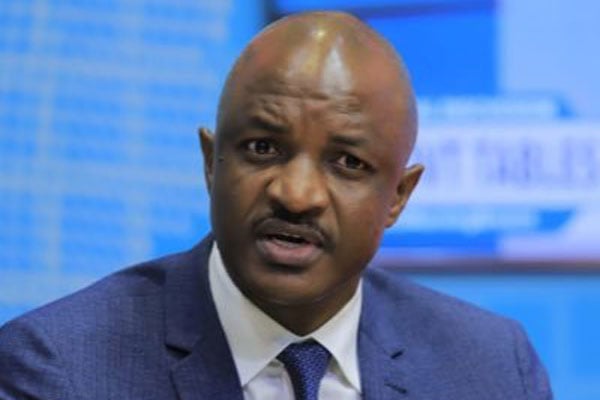Prime
We actively promote the budget for every Ugandan to understand it, says Ggoobi

Mr Ramathan Ggoobi says that government has always encouraged citizens to get involved in the budget process. Photo / File
What you need to know:
- At the global level, Uganda is ranked 44th out of at least 125 surveyed countries
The Ministry of Finance has said it actively promotes an understanding of the budget and the budgeting process by all Ugandans including ordinary citizens to ensure transparency.
Speaking in an interview, Ministry of Finance permanent secretary Ramathan Ggoobi, said government deliberately promotes budget transparency by taking the budget to the people and allows everyone within an beyond the country to critique it.
"We love it that way because transparency and openness are the only effective way to make government and leaders accountable. The rest are buzzwords," he said.
The 2023 Open Budget Survey published last week indicated that Uganda has the most transparent budget process in East Africa, which provides citizens an opportunity for “greater accountability”.
The survey, which assessed national budgets of 125 countries ranks Uganda ahead of other East African member states, and 44th globally.
Uganda is also part of the seven African countries including South Africa, Benin, Zimbabwe, Sierra Leone, Kenya and Namibia, that are ranked among the top 50 countries with the most transparent budgets globally.
Georgia, which has a score of 87 out of a possible 100 leads the global ranking, while South Africa at 83 leads Africa, followed by Benin and Zimbabwe at 79 and 63, respectively.
In East Africa, Uganda leads with a score of 59, followed by Kenya at position 48th and a score of 55.
Rwanda follows with a score of 50, while both Tanzania and DR Congo both scored 41.
Somalia (37), Burundi (14), and South Sudan 13, complete the region.
However, all the surveyed national budgets in East Africa scored below the 61 or above mark, which deems a budget to have sufficient information that can easily be reviewed and understood by citizens.
The 59 score for Uganda falls within the 41-60 band, which the survey says only provides limited information for debate thus creating the possibility of “budgeted corruption”.
The survey also assessed public participation and oversight, in which Uganda returned mixed scores.
For instance, in terms of budget oversight, Uganda scored 65 and was only beaten by South Africa on the African continent, which scored 76.
The 65 score falls within the 61-100 band, which rates oversight as “adequate”. However, Uganda posted a weak performance in terms of public participation, returning a score of 15, which is within the 0-40 band that the survey categorises as “weak”.
At a global level, the survey indicates that South Korea scores better than any country when it comes to public participation, while Norway rates better than any country in terms of oversight.
The survey assessed online availability, timeliness, and comprehensiveness of national budget documents.
Mr Moses Kaggwa, the Ministry of Finance director of economic affairs, said at the weekend that government has always ensured that the budget is accessible to all citizens, noting that right from planning to implementation, the private sector, academia, and civil society are involved.
“All budget debates, back-and-forth changes, and discussions have been made transparent,” he said, noting that during budget reading and post-budget discussions, everyone is encouraged to participate.
African countries with the most transparent budgets
Country | Score |
South Africa | 83 |
Benin | 79 |
Zimbabwe | 63 |
Uganda | 59 |
Sierra Leone | 55 |
Kenya | 55 |
Namibia | 54 |
Liberia | 52 |
Rwanda | 50 |
Cameroon | 50 |

The survey says citizens must have sufficient data on the budget to encourage accountability. Photo / File
Deliberate budget transparency
According to the Ministry of Finance permanent secretary, Ramathan Ggoobi, government deliberately promotes budget transparency by:
- Actively involving everyone in the budget process. The budget process starts with a call circular that asks all Ugandans and development partners to participate. Right from the President, Cabinet, Parliament, ministries and agencies, local governments, private sector representatives and businesses and investors, academia, civil society members, traditional and religious leaders, youth and women groups, persons with disabilities, and development partners, to average citizens, all stakeholders are consulted.
- Producing regular budget reports that contain all facts about the budget intent, allocations and policy guidance. Government ensures openness about and full disclosure of budget intentions, formulation and implementation.
- Full disclosure in the reports that are produced, including both financial and non-financial performance information. Government provides comprehensive pre-budget reports to enable Parliament to adequately review the budget proposals and also submits to Parliament and publish quarterly, semi-annual (mid-year), and annual (end-year) budget performance reports to ensure transparency and openness.
- Quality and integrity of the reports. Government discloses quality and full data on the performance of the economy, fiscal position of the economy including revenue performance, tax expenditures, financial liabilities and contingent liabilities, as well as public debt, at regular timely intervals (monthly, quarterly, annual and medium term.
Bottom-line, unlike many other countries, especially in the developing world, our budget is open for public and parliamentary scrutiny.
We also have an active and effective partnership with the civil society to examine and communicate the budget to the people.
Other non-state actors including private sector representatives, academia, development partners and media are also consulted and or engaged during the budgeting process.




